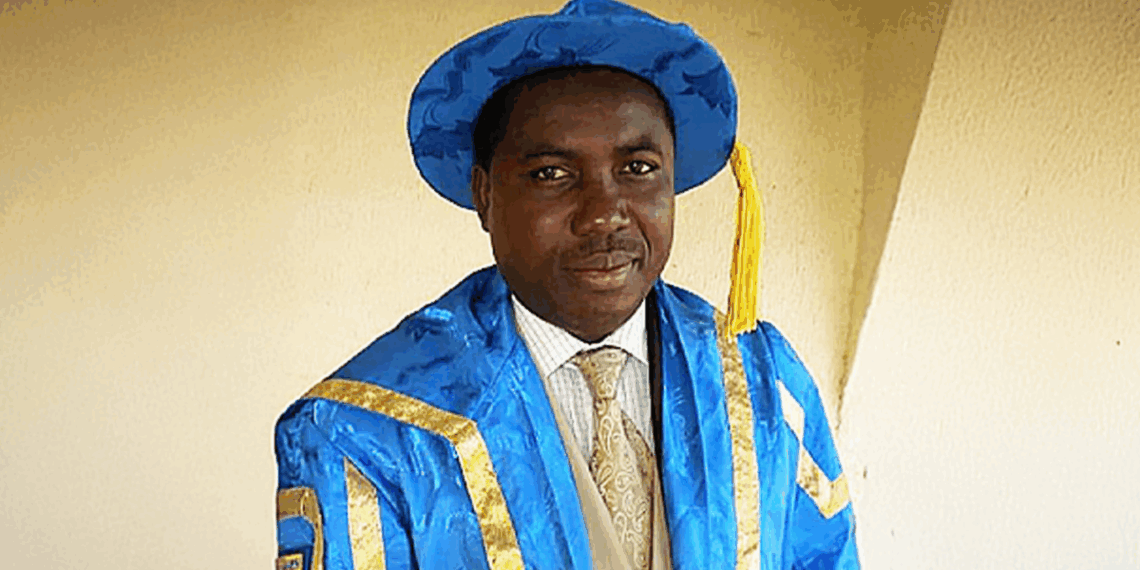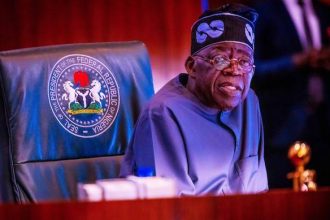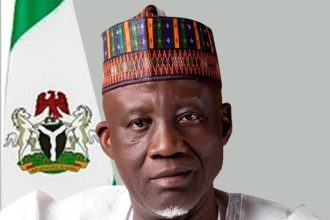- The National Council of State officially approved the nomination of Prof. Joash Ojo Amupitan (SAN) as the new Chairman of the Independent National Electoral Commission (INEC).
- President Bola Ahmed Tinubu presented Prof. Amupitan’s name to the Council to fill the vacancy left by Prof. Mahmood Yakubu, who served as INEC Chairman from 2015 to October 2025.
- The nomination will be forwarded to the Nigerian Senate for screening and confirmation, in accordance with constitutional requirements.
- He serves as Pro-Chancellor and Chairman of the Governing Council of Joseph Ayo Babalola University, Osun State, and sits on corporate boards such as Integrated Dairies Limited and the Council of Legal Education.
The Process: From Nomination to Ratification
Vacancy and Interim Leadership
Professor Mahmood Yakubu, after two consecutive five-year terms, left office in October 2025. In accordance with INEC’s internal succession rules, the most senior national commissioner was empowered to assume the role of Acting Chairman until a substantive occupant is confirmed. That person was May Agbamuche-Mbu, who has functioned as acting head for a brief interregnum.
While the acting appointment was procedural, it underscores the need for a seamless transition so as not to disrupt INEC’s operations and continuity. The Acting Chair also avoids contentious gaveling over authority during the interregnum.
Presidential Nomination and Council of State Approval
On the recommendation of the President, Prof. Amupitan was presented to the National Council of State. The Council convened and deliberated on his suitability, ultimately granting unanimous approval of his nomination. The presidency’s public statement emphasized that the nominee hails from Kogi State in Nigeria’s North-Central zone and was described by cautioners as “a man of integrity.”
It is noteworthy that the President emphasized that Amupitan would be the first person from Kogi State, and from the North-Central zone more broadly, to be nominated for the INEC Chair position.
With Council endorsement secured, the next procedural step is transmission of the nomination to the Senate, which by constitutional duty must screen and confirm the nominee before he can be formally inaugurated.
Senate Screening and Confirmation
Under Nigeria’s constitutional order, the Senate must evaluate the nominee’s suitability, competence, integrity, and capacity to hold such a sensitive office. The screening process typically involves a public hearing, submission of credentials, and responses to probing questions by senators. Once the Senate affirms or rejects, the President can then formally inaugurate the candidate.
It remains to be seen how swiftly the Senate will act, and whether any opposition or controversy will emerge during the confirmation stage. The speed and outcome of that process will likely influence public confidence in the new commission leadership.
Profile of Prof. Joash Ojo Amupitan (SAN)
Early Life and Education
Prof. Joash Ojo Amupitan was born on April 25, 1967, in Ayetoro Gbede, a community in Ijumu Local Government Area, Kogi State. He attended Kwara State Polytechnic, Ilorin, before proceeding to the University of Jos, where he obtained an LL.B degree and was called to the Bar in 1988.
He went on to earn a Master of Laws (LLM) in 1993 and a Ph.D. in Law in 2007, both from the University of Jos. His academic career began in 1989, following his National Youth Service, and he steadily rose through the ranks as a lecturer, senior lecturer, associate professor, and eventually full professor.
Academic and Administrative Career
At the University of Jos, Prof. Amupitan has held numerous leadership positions including Head, Department of Public Law; Dean, Faculty of Law; and Chairman, Committee of Deans and Directors. He has also served as Deputy Vice-Chancellor (Administration) at UNIJOS.
In addition to his roles within academia, Amupitan also serves as Pro-Chancellor and Chairman of the Governing Council of Joseph Ayo Babalola University in Osun State.
He has contributed to corporate and professional boards, including Integrated Dairies Limited, and has served on the Council of Legal Education and the Governing Council of the Nigerian Institute of Advanced Legal Studies.
Professional Distinctions and Scholarship
In 2014, Amupitan was conferred the rank of Senior Advocate of Nigeria (SAN), one of the highest honors in the legal profession. His scholarly focus spans Company Law, Law of Evidence, Corporate Governance, and Privatisation Law. Over his career, he has published multiple books and articles, supervised postgraduate students, and engaged in legal research consistent with evolving trends in governance and regulation.
Prof. Amupitan is married with four children. Given his depth of academic, administrative, and legal credentials, his appointment is widely viewed as a transition into a more scholarly and legally grounded era for INEC leadership.
The Road Ahead: Mandates, Expectations, and Challenges
Immediate Tasks and Strategic Priorities
Assuming Senate confirmation and formal inauguration, Prof. Amupitan will face a portfolio of pressing tasks:
- Reinforcing the Integrity of the Voter Register: One of INEC’s perennial challenges is maintaining the integrity, accuracy, and credibility of the voter register. The new leadership will be expected to ensure rigorous updating, cleaning of duplicate or invalid entries, and robust safeguards against fraud.
- Leveraging Technology Responsibly: Technology (e.g., electronic voter accreditation, transmission of results, use of biometric tools) has featured prominently in Nigeria’s electoral architecture. Amupitan must balance innovation with reliability, ensuring systems are resilient, tested, and transparent to stakeholders.
- Ensuring Timely Delivery of Elections: Elections in Nigeria are often hampered by delays, logistical bottlenecks, or security challenges. The new chair must prioritize planning, logistics, procurement, and coordination well ahead of each electoral cycle.
- Bolstering Stakeholder Confidence and Neutrality: Maintaining public trust is critical. The chair will need to ensure institutional independence, guard against political interference, and promote fairness in all phases (candidate registration, campaigning, voting, adjudication).
- Reforming Electoral Laws and Regulations: Some analysts expect that Amupitan, given his legal background, might push for reforms strengthening enforcement mechanisms, clarifying ambiguities in electoral laws, and improving dispute resolution frameworks.
- Managing Internal INEC Dynamics: Bringing cohesion to the commission’s internal operations, staff training, capacity building, and resource mobilization will also be part of his portfolio.
These tasks are nontrivial, and success will depend not only on his leadership but on political will, funding, institutional support, and the security context across Nigeria’s many states.
Political Context and Implications
The appointment comes at a politically sensitive time. With ongoing concern about electoral credibility, civil society groups, opposition parties, and citizens alike will observe every move of the new INEC leadership with scrutiny.
Amupitan’s neutrality will be tested, especially as Nigeria heads toward future gubernatorial, state assembly, and the all-important 2027 general elections. Whether he can withstand partisan pressures especially in contested states will be a key measure of his legacy.
His origin from Kogi State, hitherto unrepresented at the highest levels of INEC, also raises expectations about inclusivity and regional balance. Some may interpret it as an attempt to broaden representation, while skeptics may worry about perceived regional influences.
Further, how the Senate handles his confirmation whether it becomes contentious or smooth could affect public perceptions of legislative independence and oversight.
Responses and Reactions
Support from Kogi State Government
The Kogi State Government promptly issued a congratulatory message, expressing that the appointment is a validation of President Tinubu’s commitment to merit, excellence, and national inclusiveness. The statement noted that Prof. Amupitan’s distinguished career and reputation for integrity should bode well for his new role.
Remarks from Governors and Political Actors
Several governors and political figures have also responded positively. Within the Council of States session, Governor Ahmed Usman Ododo described Amupitan as “a man of integrity,” lending further weight to the consensus view among state executives at the meeting.
It remains possible, however, that opposition parties and civil society groups will issue their own assessments and caveats, particularly around the maintenance of institutional independence and impartiality.
Comparisons and Precedent: INEC Chairmanship in Historical Perspective
In this context, Amupitan’s tenure will be judged not just on administrative performance but on restoring or improving the public’s trust in the electoral process.
Risks, Watchpoints, and Benchmarks
Potential Hurdles
- Partisan Pressure: Managing influence and pressure from political actors will test institutional independence.
- Funding Constraints: Adequate funding is crucial for logistics, technology, training, and security deployment.
- Security Challenges: In volatile states, conducting elections safely will require close coordination with security agencies.
- Technology Failures: Any system glitches, breaches, or irregularities could erode confidence.
- Court Disputes: Post-election litigation will remain a test of INEC’s procedural robustness and fairness.
- Public Perception: Even minor slip-ups may be seized upon by critics or opposition voices.
Metrics for Success
Some key performance indicators that observers may use to evaluate Amupitan’s success include:
- Timeliness: Were scheduled elections conducted without major delays?
- Accuracy of Voter Register: Reduction in invalid, duplicate, or phantom entries.
- Transparency: Open data, credible audits, stakeholder engagement.
- Turnout and Participation: Whether confidence in the process leads to increased civic participation.
- Dispute Resolution Record: Efficient handling of complaints, challenges, and petitions.
- Public Trust Indices: Surveys and polls on citizens’ trust in INEC over time.
If Amupitan can post early wins such as smooth off-cycle polls or local elections in contested states—he may gain political capital and goodwill necessary to tackle harder tests (e.g. the 2027 general elections).













https://t.me/battle_games_com_bot/start?startapp=frndId1891914791
https://www.facebook.com/CoLabBrands